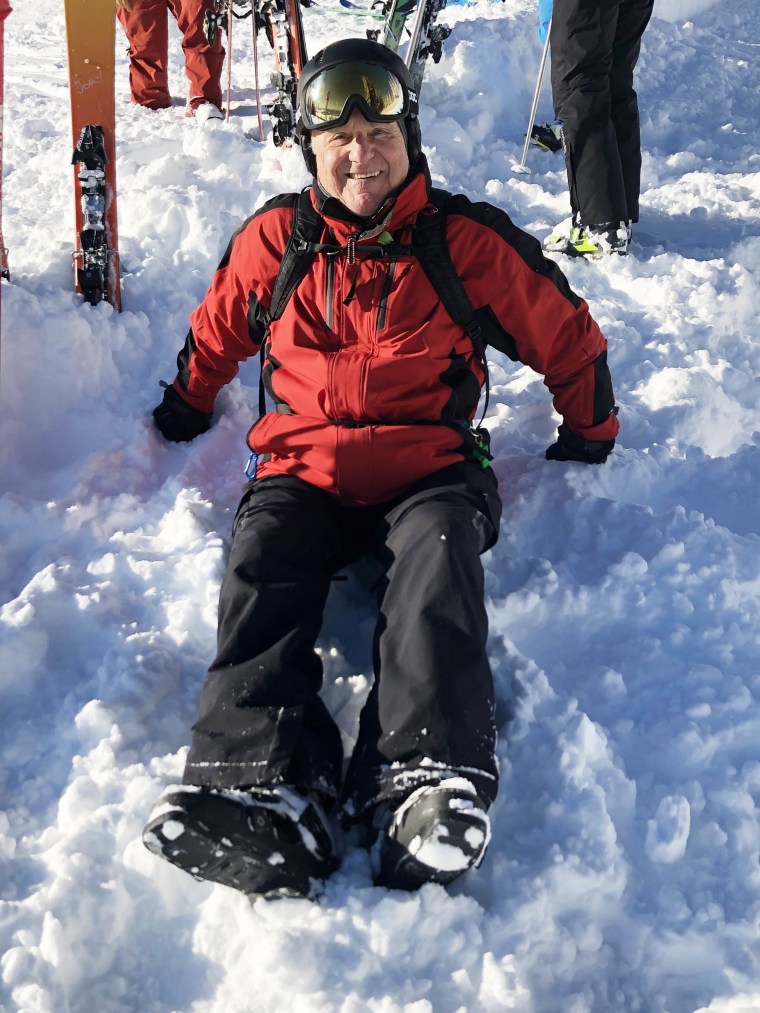For Gail and Zel Bocknek, the approval of a new drug to manage Alzheimer's disease this month has meant confidence, hope — and a return to the slopes.
Zel Bocknek, 89, who has Alzheimer's disease, was one of almost 1,800 participants in a clinical trial evaluating the drug lecanamab, also known by the brand name Leqembi. He's been getting infusions of the medication every two weeks for the last two years. So far, his results show that the progression of his Alzheimer's has halted.
"All I can say is I feel I’ve been exactly the same," he told NBC's Maria Shriver for a July 12 segment on the TODAY show. "When they test me, everything is basically the same. I haven’t changed."
He's also been a passionate downhill skier since age 16 — and is looking forward to the winter ski season coming up.
“Taking this drug has given me a lot of confidence,” he said. “And it has kept me exactly where I am.”

What is Leqembi?
Lecanamab is a new treatment for patients with Alzheimer's disease who experience mild cognitive impairment.
The Food and Drug Administration first approved Leqembi in January through an accelerated approval pathway. And this month, the FDA gave the drug full approval after a clinical trial confirmed that it could provide benefits to patients.
This 18-month, phase 3 clinical trial, in which Zel Bocknek participated, found that participants experienced an average of 27% slowing of cognitive decline.
The drug is administered as a twice-a-month infusion treatment and targets beta-amyloid proteins in the brain, NBC News explains. Researchers have long thought that these proteins, which can clump together and build up into plaques, might be at the root of Alzheimer's disease.
Full approval of lecanamab "is the first verification that a drug targeting the underlying disease process of Alzheimer’s disease has shown clinical benefit in this devastating disease,” said Dr. Teresa Buracchio, acting director of the Office of Neuroscience in the FDA’s Center for Drug Evaluation and Research, in a press release. “This confirmatory study verified that it is a safe and effective treatment for patients with Alzheimer’s disease.”
As Joanne Pike, DrPH, CEO of the Alzheimer's Association, explained on the TODAY show, "it slows down progress at the earliest stages for a period of time." But while the new drug is a "momentous" and "pivotal" development, it's also "not a cure," Pike said.
And, like any drug, there are risks that come with taking lecanamab. In the clinical trial, 12.6% of participants experienced brain swelling, and 17% experienced brain bleeding. Some people may develop headaches, dizziness, confusion, nausea, vision changes and seizures along with those brain changes, the FDA noted.
The drug costs an estimated $26,500 per year. But, with the new traditional FDA approval, more insurers — including the Centers for Medicare and Medicaid Services — will likely help cover the costs.
The Bockneks, who have been married for nearly 59 years, see the new drug as helping them continue to live their lives how they want.
"I think most people see (an Alzheimer's diagnosis) as the end. It’s like the curtain’s coming down," Gail Bocknek said. "This kind of drug ... gives people hope that this is not the curtain coming down. This is just another tool ... that we can use and have hope and move forward."
Although Zel Bocknek's memory had been declining for years, he's still able to get around and take care of day-to-day tasks following his wife's knee surgery.
While the thought of the drug's side effects may be off-putting for some, Gail Bocknek said she's felt confident in the care her husband has received since taking the medication.
"Let’s just move one foot in front of the other and keep going as long as we can with a view that we have a future," she continued. "We’re seeing our grandchildren grow up."